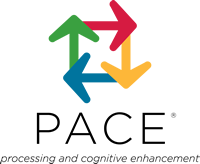Austin Learning Solutions is a certified PACE provider
PACE is a therapeutic program that helps children and adults improve their processing skills, allowing them to function at a higher level in school, work, and day to day life.

Pace strengthens mental abilities — the skills and tools we need to learn or work faster, easier and better
We have used this program for years because of the results we see in students' lives. We address executive functioning skills and cognitive therapy through this program.
PACE is a therapeutic method of improving one’s ability to process and use sensory information to function well in everyday life. It is scientifically based and asserts that training procedures can change and improve the mind and its mental structure by retraining mental skills and processes. These skills are retrained through a series of tasks that are designed to meet specific goals. The tasks are related, make repetitive demands on a deficient skill, and progressively increase in difficulty. This is a process-specific approach to training (as opposed to a general stimulation approach).
Training focuses on:
- working memory
- logic/reasoning
- auditory processing
- visual processing
- word attack
*** These are important foundational executive functioning skills.
Why PACE?
Many learning problems affecting a person’s performance in school or work reflect, to some degree, a lack of cognitive skills; the skills needed to process information. Without these skills, learning is incredibly difficult. What causes this lack of skills is debated, but results show that by improving these skills, remarkable improvements of performance are possible.
A major difference in school or work success is the tools one has to work with. Consider the difference in performance between a type writing and a laptop. The same impact on the ease and speed of learning can be achieved when the mental skills are developed or enhanced.
PACE is at the Forefront of Applying Current Research to Learning
Traditional help for individuals with learning struggles has typically focused on one of four methods:
- sensory therapy (vision, auditory)
- motor therapy (speech, occupational)
- psychotherapy (motivation)
- academic remediation (remedial reading, learning disabled programs, tutoring)
In the last few years, great strides have been made by researchers to expand our understanding of how the brain works. This has allowed for the creation of better learning models and remedial strategies to help those who have difficulty learning. Today, PACE is at the forefront of using this knowledge to make significant improvements in learning skills. PACE is a training program that affects and modifies mental skills, or what we generally refer to as intelligence.
PACE Improves Mental Skills
PACE is a method of improving one’s ability to process and use sensory information to function well in everyday life. It is scientifically based and asserts that training procedures can change and improve the mind and its mental structure by retraining mental skills and processes.
These skills are retrained through a series of tasks that are designed to meet specific goals. The tasks are related, make repetitive demands on a deficient skill, and progressively increase in difficulty. This is a process-specific approach to training (as opposed to a general stimulation approach).
Studies Show that Mental Skills are Modifiable
PACE works to modify mental skills, and there are numerous studies that show this modification is possible. The results not only show tremendous changes in processing skills (a 3.6 year improvement in 10 weeks), but also a significant transfer to higher mental skills (logic & reasoning – a 23-point gain in IQ).
PACE Training Sessions Are Intense and Effective
PACE is a twelve week one-on-one program that is fast-paced and intense. The trainers provide constant feedback as the student progresses through sequenced levels. The student meets with a trainer 2 to 3 times a week and completes exercises at home with a parent on the other days of the week, with one day off from PACE practice each week.
Each procedure is graded according to difficulty and tasks become progressively more complex. Pace is regulated by mastery, so the number of tasks completed during training differs from student to student. In other words, once the student passes a task, he or she is then allowed to progress to the next challenge and more difficult task (increasing their cognitive load).